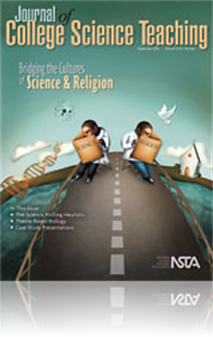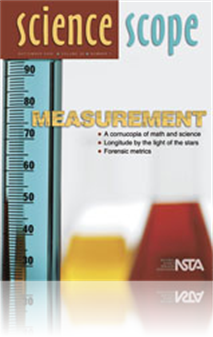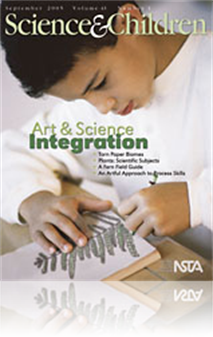All Resources
Journal Article
An Interdisciplinary Study of the SARS Virus: A One-Semester First-Year Seminar
An interdisciplinary study of the SARS virus provides opportunities for students in different disciplines to discuss the origin; spread; and global, economic, chemical, and biological aspects of disease. Students benefit from active discussions with ...
Journal Article
Idea Bank - Education and Research: Testing Hypotheses (EARTH)
The Monterey Bay Aquarium Research Institute (MBARI) and the Monterey Bay Aquarium (MBA) have created an educational outreach program titled "Education and Research: Testing Hypotheses (EARTH)," which will serve as a portal to a wealth of ocean obser...
Journal Article
Society for College Science Teachers: Was "Inquiry" a Mistake? It's all in the Name
If teaching by inquiry is recommended as a practice for science teachers because it models the practice of scientific researchers and research supports it, why do scientific researchers resist it? The arguments vary--we teach the way we were taught,...
Journal Article
Student Geoscientists Explore the Earth: During Earth Science Week 2005
Visit the American Geological Institute (AGI) Earth Science Week website to learn about how you can provide your students with inquiry-based learning experiences that celebrates the theme, "Geoscientists Explore the Earth." On the website you will fi...
Journal Article
This article describes the curriculum for a highly student-centered human biology course constructed around a series of themes that enables the integration of the same basic paradigms found in a traditional survey lecture course without sacrificing e...
Journal Article
Science Sampler - Project weigh-in: Learning about mass and weight
Using the triple beam balance to measure mass in metrics is just one of the many skills we want our students to master. This article highlights a few effective and fun approaches to develop this skill over a couple of interesting days. With each acti...
Journal Article
Science Sampler: Mastering metrics
By the time students reach a middle school science course, they are expected to make measurements using the metric system. However, most students, and most U.S. residents for that matter, are not proficient with it. To determine your students levels ...
Journal Article
A Message from the NSTA President: Developing a World View for Science Education
In this section, NSTA President Michael Padilla shares a story reflecting the affect that immigration has had on almost all school systems across the country. He shares his motivation for choosing Developing a World View for Science Education as the...
Journal Article
Editor's Corner: Science Safety
With increasing emphasis on hands-on inquiry activities, teachers need to be as knowledgeable as possible about safety. Unfortunately, accidents in science classrooms are no exception! As a result, the theme of this issue of The Science Teacher (TST)...
Journal Article
The interdisciplinary connection between science and art is easily accomplished in the elementary classroom using plants as focus organisms. Observing, dissecting, growing, drawing, and painting plants can also be used at multiple grade levels to tea...
Journal Article
Most middle-level students are very appearance-conscious, and an accidental spill in the cafeteria can result in a daylong struggle to cover an embarrassing stain. Thanks to the science of nanotechnology, now students can enjoy a slice of pizza witho...
Journal Article
A Message from the NSTA President: Developing a World View for Science Education
In this section, NSTA President Michael Padilla shares a story reflecting the affect that immigration has had on almost all school systems across the country. He shares his motivation for choosing Developing a World View for Science Education as the...
Journal Article
Editorial: Moving On but Staying Around
One of the many benefits of college and university teaching is that it is often possible to remain active in school affairs after retirement. Some elder faculty continue to teach while others participate in research and take part in seminars and col...
Journal Article
Easy Ways to Promote Inquiry in a Laboratory Course: The Power of Student Questions
To teach students to think like scientists, we modified our laboratory course to include regular opportunities for student practice of inquiry and the scientific process. Our techniques are simple; they can be implemented without rewriting lab manual...
Journal Article
Mathematics is said to be the language of science. If this is true, then measurement is certainly the popular language. Since mathematics and science both claim measurement to be integral aspects of their curricula, measurement is a natural beginning...






